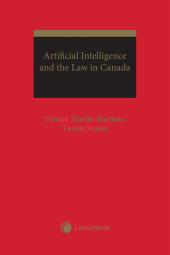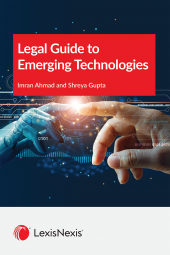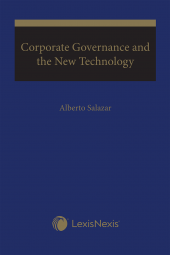Artificial Intelligence and the Law in Canada
This book, which features an impressive slate of contributing authors, offers the first comprehensive Canadian examination of this quickly evolving subject matter and the implications of our attempts to regulate it.
One Year Subscription Only Terms
Subscribers receive the product(s) listed on the Order Form and any Updates made available during the annual subscription period. Shipping and handling fees are not included in the annual price.
Subscribers are advised of the number of Updates that were made to the particular publication the prior year. The number of Updates may vary due to developments in the law and other publishing issues, but subscribers may use this as a rough estimate of future shipments. Subscribers may call Customer Support at 800-833-9844 for additional information.
Subscribers may cancel this subscription by: calling Customer Support at 800-833-9844; emailing customer.support@lexisnexis.com; or returning the invoice marked 'CANCEL'.
If subscribers cancel within 30 days after the product is ordered or received and return the product at their expense, then they will receive a full credit of the price for the annual subscription.
If subscribers cancel between 31 and 60 days after the invoice date and return the product at their expense, then they will receive a 5/6th credit of the price for the annual subscription. No credit will be given for cancellations more than 60 days after the invoice date. To receive any credit, subscriber must return all product(s) shipped during the year at their expense within the applicable cancellation period listed above.
Product description
"I would recommend that my fellow legal information professionals read the chapters on equality by design, legal ethics, judicial decision-making, and legal analytics. At the very least, most of us are using legal research tools that leverage AI, while some of our colleagues are increasingly involved in legal operations and in selecting legal technology. To the extent that these chapters reference technologies with which legal information professionals may be called upon to interact, it is important for us to be aware of the risks and opportunities relating to their use and any legal implications."
Reviewed by Katarina Daniels, Liaison Librarian
Nahum Gelber Law Library, McGill University
See the review in 2021 Canadian Law Library Review 46:4 (page 30)
In the introduction to the new volume, Artificial Intelligence and the Law in Canada, the editors state that the rapid advance of AI technologies means that we must ensure that our legal frameworks can apply – and adapt – to this “fundamentally disruptive technology.” This book, which features an impressive slate of contributing authors, offers the first comprehensive Canadian examination of this quickly evolving subject matter and the implications of our attempts to regulate it.
A Thorough Analysis
Artificial intelligence is permeating virtually every aspect of our everyday lives – from the economy and our work, to medicine and engineering, to the decision-making processes of government and business. In many instances, development of the technology is outpacing regulation efforts; there has in fact been little AI-specific litigation or legislation in Canada to date. By taking a close look at both the risks and potential inherent in AI technologies, Artificial Intelligence and the Law in Canada provides valuable insight into the current state of AI in Canada as well as how the technology interacts with traditional areas of law, including intellectual property, contracts, torts, data protection, competition, administrative and health.
This book illustrates the range of legal and public policy challenges related to AI that Canada faces. The authors are leading Canadian scholars who offer insight into the key issues in question, how existing laws might apply, the gaps that exist and the topics that law reform should address.
Essential Reading
This ground-breaking text is an invaluable reference for anyone interested in AI and the associated privacy law issues, including:
- Legal advisors, such as privacy and access lawyers, technology lawyers, media / communications / marketing / advertising lawyers, in-house counsel, public sector counsel and legal researchers, who need a resource to assist with researching and advising on privacy law issues in a connected world
- Regulators, law enforcement personnel and policy makers, including judicial personnel and judges, as it provides a summary of this evolving area of privacy law
- Business professionals, such as corporate strategists, risk and compliance managers, technology consultants, privacy advisors, corporate investigators and privacy officers, as it offers guidance on complying with privacy laws in this area
- Academia, including law libraries and law students, as it is a valuable privacy law teaching aid and reference work
Table of contents
Introduction
Chapter 1. AI and Copyright Law
Chapter 2. AI and Patents and Trade Secrets
Chapter 3. AI and Contract Law
Chapter 4. AI and Tort Law
Chapter 5. AI and Data Protection Law
Chapter 6. AI and Competition Law
Chapter 7. AI and Administrative Law
Chapter 8. AI and Health Law
Chapter 9. AI and Human Rights
Chapter 10. AI and Technology-Facilitated Violence and Abuse
Chapter 11. AI and Equality by Design
Chapter 12. AI and Legal Ethics
Chapter 13. AI and Judicial Decision-Making
Chapter 14. AI and Legal Analytics
Chapter 15. AI and International Regulation
Chapter 16. AI and the Law in the European Union and the United States
 Lexis Nexis
Lexis Nexis 



